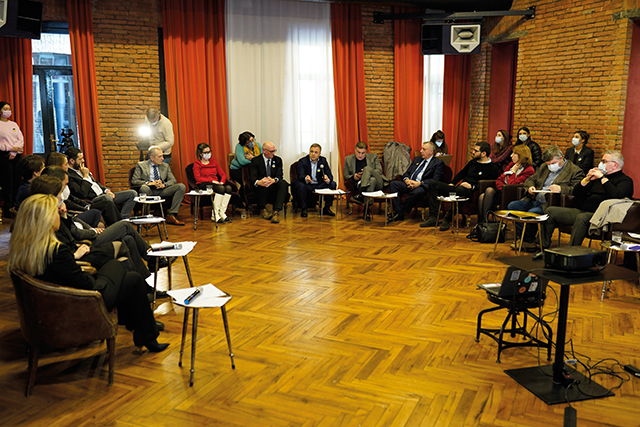On March 15, PMCG, in partnership with the USAID Industry-Led Skills Development Program, officially launched the Business Leaders’ Council in Georgia, a joint initiative aimed at engaging private sector in skills development.
The Business Leaders’ Council, a private sector engagement tool, is expected to become the voice of businesses for designing innovative skills development solutions, and to provide a mechanism for building trust, sharing information, and eliciting advice from experts. It will provide an opportunity for the private sector to actively participate in the identification of challenges and creating solutions to address skills constraints, helping the USAID Industry-Led Skills Development Program respond to the most urgent needs of employers, and provide a platform for peer-to-peer information sharing.
It will be the voice of businesses for designing innovative skills development solutions, and a mechanism for building trust, sharing information, and eliciting advice from experts
Peter Wiebler, USAID/Georgia Mission Director, opened the event, gathering business and industry leaders across priority sectors of the economy.
“This event brings together Georgian private sector leaders, the country’s largest companies, and the largest associations in order to discuss business needs and help people master the necessary skills and professions,” Mr. Wiebler said. “The aim of the Council is to enable employers to have qualified staff and, on the other hand, for people to have a means of employment. There are many challenges in Georgia today, but the main thing to focus on is the quality of education, improving foreign language and technical skills, as well as critical thinking. This is what this meeting is about, to discuss and to understand the main problems and to start solving them together.”

The presentation was followed by a panel discussion moderated by Aleksi Aleksishvili, CEO and Chairman at PMCG, focused on how the private sector can contribute to effective industry-relevant skills development programs that provide job seekers with the skills needed for obtaining high-value employment.
“The purpose of this platform is to create a bridge between businesses and academic professional education. It should be a space where businesses can state their challenges, needs and demands, as well as their solutions. What we are seeing now is that there is no direct unification between supply and demand. How can we respond to that? That is what we are going to talk about in this space,” Aleksishvili noted.
There are many challenges in Georgia today, but the focus should be on the quality of education, and improving foreign language and technical skills, and critical thinking
“USAID is implementing this program in partnership with the private sector, because professional education and human capital development is what the private sector needs in the first place, moreover the private sector representatives know the needs and challenges of their industries, therefore, USAID makes relevant decisions relying on this information,” said Otar Berishvili, Executive Director of Adjara Group, adding, “Representatives of different businesses from different industries should raise awareness of these needs and implement new programs in this regard with public and various organizations.”
Ultimately, the USAID Industry-Led Skills Development Program anticipates benefitting up to 4,800 individuals who will complete workforce programs, with at least, 3,840 receiving new or better employment.















